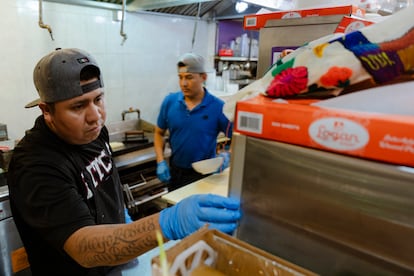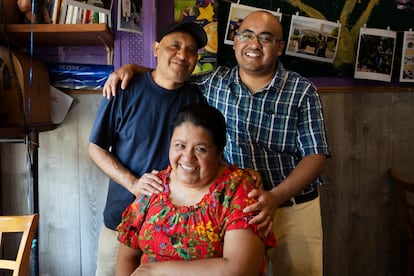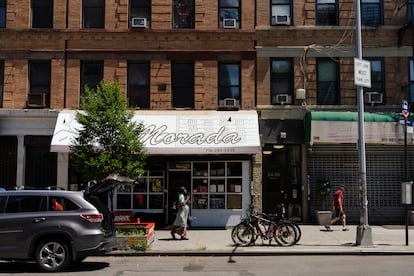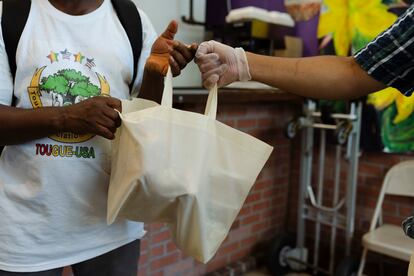La Morada, the place for ‘all those who are hungry’ in New York
Every day, in this restaurant in the Bronx, the Méndez-Saavedra family distributes more than 500 free meals to immigrants who have recently arrived in the city

The two o’clock sun hits Willis Avenue, in the south of the Bronx. No one leaves or enters the Ortiz Funeral Home. Nor is there any movement at Chen’s Garden, a Chinese restaurant. But between the funeral home and the restaurant is La Morada, whose door hasn’t stopped opening or closing all afternoon.
An older man enters the restaurant. He arrives alone, yet Natalia Méndez prepares a bag with enough food to feed four people. The man’s wife and two children didn’t come this time. The bag has a container with rice, chicken fajitas, vegetables and beans. The gentleman — who hails from a country in Africa — is one of hundreds of migrants who pass through La Morada restaurant every day, starting at noon. Méndez knows that the man’s journey was long. That’s why the bag of free food that she gives him is full of beans.
“Those people walked through Africa and part of America to get here,” she sighs. “You see them and you know that they need to get stronger. That’s why we’re making more stews, so that they receive everything they need. We traditional cooks are also like healers.”
Méndez, 54, has no doubt that the thousands of migrants who have arrived in New York City over the last two years need to eat stew, just as she knew how, during the pandemic, New Yorkers needed to eat root soup. One day, in the middle of the lockdown, she left with her husband, Antonio Saavedra, for La Morada. They began to prepare what she calls “the root soup,” based on beets, carrots, potatoes and any food that grows underground.
“I was thinking about a dish that could help the New York community during Covid,” Méndez recalls. “That’s where the idea of making the soup came from. These products grow in different soils: some are from New Jersey, others are from Florida, from California. And, when they all come together in the pot, [they have all the nutrition] we need.”
To finish the soup, Méndez adds pumpkin. The first day they distributed it, the soup was gone in an hour, after the long line of people who came to pick up their free food. The second day, they made enough for 400 people. Then, for 600. Then 800. They managed to distribute 5,000 canteens in a week.
Méndez says that La Morada is a “worn-out” place. She’s always had a sign displayed that reads “No to deportations.” Migrants have always passed by to ask where they can find a school, a hospital, or a place to sleep. But after the restaurant became the spot where many people could get a free lunch, La Morada could no longer maintain its perfectly-organized bookshelf, nor keep its tables in a straight row. It lost the feeling of an orderly restaurant: it now has the aura of a kind of warehouse, filled with boxes of donated foodstuffs, rows of cups and plastic containers, as well as people coming and going until they close at four in the afternoon.

A place like this, however, makes Natalia and Antonio feel much more fulfilled. From the purple walls hang the canvases painted by their 34-year-old son, Marco Saavedra. There are also images of the family’s campaign to be a beneficiary of DACA, a certificate from the New York City Council in honor of Méndez and Saavedra for their contribution to the community, along with numerous photographs of people who have passed through the place over the years.
There are no pictures of Alexandria Ocasio-Cortez, Jesse Eisenberg, or Bill de Blasio, all of whom have stopped by. “He’s famous,” Antonio Saavedra acknowledges, when asked about the former mayor. “But I get more of those other kinds of people who come to eat.”
Activism is at the center of La Morada. On their social media accounts, Méndez, her husband and their three children have campaigned about the public housing crisis in the city and the mismanagement or misuse of resources by Mayor Eric Adams in caring for newly-arrived immigrant families, who languish on the streets or in shelters. These are the same people who later pass through La Morada.
Méndez remembers the day a mother arrived. She came carrying a child; she was holding another by the hand. There were two more children that she couldn’t hold. “I had received some donations of baby slings and I gave them to her. She couldn’t handle so much of a load. I gave her balm, clothes, shoes, food. My role is to be a mother,” she affirms. “The mother of all those who are hungry.”
Méndez — who wears a black apron and a hairnet — learned to cook at the age of six. All the women in the family taught her how. From her mother — who had 11 children — she learned how to work hard. From her maternal grandmother, she learned how to stretch a meal: “If you cook with awareness, if you cook tasty food, if you cook well and know how to serve, everyone can eat.” And, from her paternal grandmother, she learned about the nutritional values of foods. “When you cook, it’s to be strong, healthy, intelligent… to grow. It’s not good for you to eat empty things, without nutritional value. You have to eat things that come from the soil, cook them with fire. Cooking is something solemn, from washing your hands and wiping them dry,” she emphasizes.
An aunt taught Méndez about how to conserve food, which is why there’s nothing left over in her kitchen. “For the organizations that have the luxury of receiving resources from the government, they buy food in bulk [and have to] demonstrate that they spent [the funds]. When they don’t know what to do with the extra food, they call La Morada and ask if we want to pick up potatoes, carrots, onions. Then, I clean them well and cook them,” she tells EL PAÍS.
In the New York City government — where she has gone to obtain permits to operate her business — Méndez has learned other lessons, although she’s found little meaning in them. For instance, the Health Department warned her that she must keep food in the refrigerator, cover it tightly and keep it at 41°F. However, in Méndez’s kitchen, they make portions as they go. And, if more hungry people arrive, they just cook a little more.
“Why do I want to store a meal?” she asks aloud. “What I want is to eat it and share it. We learned that from our ancestors: the spirit of food escapes if you keep it in the refrigerator. You have to eat it when it’s fresh!”

In 2009, amidst the uncertainty that the Great Recession brought to the United States, Méndez and her husband rented the space where La Morada is located today. They got it for a good price. The couple arrived from the southern Mexican state of Oaxaca when they were in their early-twenties. They’re from the town of San Miguel Ahuehuetitlán, where the Mixtec Indigenous languages are spoken. Méndez learned Spanish when she was 12-years-old, but it was in New York where she began to speak it fluently. She also learned to read and write. “Not well, but I know how to write,” she clarifies. She refers to her city as the “school of life.”
In February 1992, when they arrived, the New York winter cut their skin. “The temperatures were freezing and we had no shelter. We were almost barefoot, without a home, without family, without the language, without papers. We had left our two small children in Mexico. The hardest thing of all wasn’t that we didn’t have a home, a coat, shoes, or a job; the hardest thing was having left my two children behind, it was like having two swords in my soul.” A man who saw them sitting on a curb in Washington Heights offered them a ride to his house, on the condition that they work and then pay for their room. The couple worked hard and, within six months, they rented their first apartment in the city.
Méndez found the escalators in New York City to be strange. She thought about how those endless metallic steps worked. And, to this day, she has memories of how she and her colleagues had to escape ICE agents by hanging from the steel cables of an elevator, while working in the city’s factories. “La migra” would show up in the factories and undocumented employees had to run so that they wouldn’t be caught. She toiled in the large workshops that made clothes for companies like Donna Karan or Calvin Klein. Migrants worked up to 10 hours a day and were paid the bare minimum, while buttoning, sewing, folding and shipping the clothes of New Yorkers.
After years of backbreaking work, La Morada was born. “It was our dream,” Méndez says. She looks indignant when she discusses how “so many negative comments are made about undocumented immigrants, that we’re just a burden, looters, that we take from them, that we steal from them, that we’re criminals. What’s more, with these hands — which I’ve used to do so much work for other people — I believe I’ve enriched the country. Never, ever, since the first day I arrived in New York, have I taken anything from anyone. We’ve paid a lot of taxes to the city. I’ve always believed that I have ancestral, gastronomic, native, ancient, Mixtec, Mexican riches in my hands. I wanted to share them with New Yorkers.”
With the money raised and with her husband’s experience as a food deliveryman for many restaurants in the city, Natalia and Antonio made a change and opened La Morada, a half-hidden place in the Bronx, with a menu offering meals between $3 and $20, prices that lower-income people can afford.
Antonio Saavedra, 56, doesn’t remember the name, but someone who worked for the Michelin Guide once visited La Morada and praised the food. “He told us that they didn’t give us stars because the dishes were very cheap, even though they were good,” Saavedra recalls. “I told him, ‘this isn’t a luxury restaurant.’” This has also been Méndez’s battle: “We all have the right to eat and eat well. It’s not just something for the wealthy. That’s my fight and it’s always been my fight.”
As soon as she says that, Méndez shouts: “There are two people at the door!” Throughout the interview with EL PAÍS, her son, Marco — who arrived in the United States with his sister a year after his parents — has been taking phone calls or tending to a table of diners. He grabs two bags of food and gives them to the two people who came for lunch. Since nine in the morning, in the 100-liter pots and in the several overused cauldrons (which have already broken four stoves), the family has been preparing the food that they then distribute for free. La Morada gives out more than 500 meals each day. Additionally, on the menu, they have a wide array of dishes, including moles, enchiladas, carnitas, tacos, milanesas, tlayudas, stuffed chiles, sopes, cecinas, nachos, or quesadillas.

The concept, Méndez tells EL PAÍS, is to “cook, sell and share.” La Morada is supported by what they sell to some customers, the tips left by diners, the contributions that the community makes to a GoFundMe campaign, the universities that hire their catering services, the organizations that support them with some donations, as well as other funds that participate in the idea of “mutual aid.”
“As a cook,” Méndez details, “I’m not [thinking about] how much this or that is going to cost. I’m cooking for whoever’s hungry. Whoever can pay, well, that’s great. We can then buy one more dollar of beans or rice and we can cook 10 or 15 lunches for those who can’t.”
Translated by Avik Jain Chatlani.
Sign up for our weekly newsletter to get more English-language news coverage from EL PAÍS USA Edition
Tu suscripción se está usando en otro dispositivo
¿Quieres añadir otro usuario a tu suscripción?
Si continúas leyendo en este dispositivo, no se podrá leer en el otro.
FlechaTu suscripción se está usando en otro dispositivo y solo puedes acceder a EL PAÍS desde un dispositivo a la vez.
Si quieres compartir tu cuenta, cambia tu suscripción a la modalidad Premium, así podrás añadir otro usuario. Cada uno accederá con su propia cuenta de email, lo que os permitirá personalizar vuestra experiencia en EL PAÍS.
¿Tienes una suscripción de empresa? Accede aquí para contratar más cuentas.
En el caso de no saber quién está usando tu cuenta, te recomendamos cambiar tu contraseña aquí.
Si decides continuar compartiendo tu cuenta, este mensaje se mostrará en tu dispositivo y en el de la otra persona que está usando tu cuenta de forma indefinida, afectando a tu experiencia de lectura. Puedes consultar aquí los términos y condiciones de la suscripción digital.








































